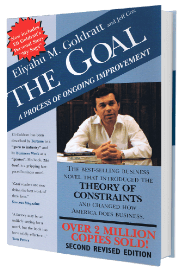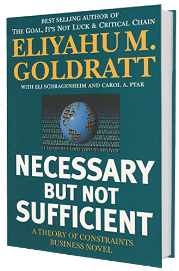Resources
Resources to help you get even more benefits from roadrunner and Eli Goldratt’s Theory of Constraints.
What we’re reading
The Goal

What it is
One the world’s most-influential business books. In it, renowned author Eli Goldratt explains why traditional efficiency improvement methods fail, and offers a breakthrough alternative.
Why we recommend it
Everything we do is based on the Theory of Constraints methods outlined here. There’s no better way to learn what it is, and how we use it to drive-up performance.
Request a FREE copy of The Goal
What we’re reading
Necessary But Not Sufficient

What it is
"To realize value, bottom-line value, technology is Necessary but Not Sufficient." NBNS outlines why most ERP investments, while often necessary, are not sufficient to deliver sustainable business results. System-wide based business management methodology and associated behaviour changes need to be driven outside of a technology platform to solve supply chain and operations management problems.
Why we recommend it
In its analysis of supply chain technology, NBNS ultimately outlines the basis for Demand Driven Replenishment and Production Management approaches and prescribes how to leverage your ERP investment to increase availability, reduce inventory and maximize system throughput.
Request a FREE copy of Necessary But Not Sufficient
FEATURED POSTS
Manufacturing Tech Insights – CMS Montera – Bridging the Gap between Business and Operations
CMS Montera is featured as the Company of the Month in Manufacturing Tech Insights’ October 2015 issue and makes the publication’s Top 10 list of Manufacturing Execution System providers.
Gaining Competitive Advantage through Reducing Project Lead Times
This Whitepaper by Duncan Patrick and Jack Warchalowski of CMS Montera published as part of the 2013 PMI Global Congress Proceedings.
Continuous Improvement Trio
Why LEAN and Six Sigma should always be implemented under the focusing umbrella of TOC. Written by Pirasteh and Farah, and published in the May 2006 issue of APICS.
Solving the Two Biggest Mistakes Made by Manufacturers
Two common mistakes almost all manufacturers make, and simple solutions derived from the Theory of Constraints approach to Demand Driven Replenishment and Flow Issue Reporting.
What’s Next for Innovative Food Manufacturers? Increase Sales by 40%
A recent client success story where a food manufacturer ventured outside the box and took over the replenishment and assortment decisions for their product at a large retail food chain.
Grow Your Sales by 25%: Make-to-Order vs Make-to-Stock
The drawbacks of the traditional approaches to using Make-to-Stock and Make-to-Order, and the growth benefits of a new approach based on the Theory of Constraints’ Demand Driven Replenishment.